Could Jeremy Corbyn be Labour's next leader?
- Published
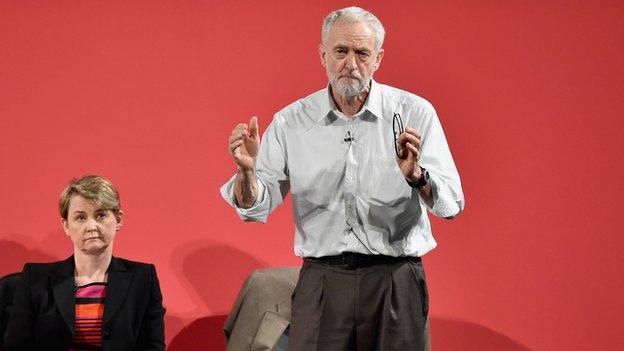
Veteran left-winger Jeremy Corbyn was a rank outsider in the race to be Labour's next leader but now speculation is mounting that he might just take the prize. Could it happen?
He rails against austerity. He's happy to talk to Hamas and Hezbollah - even if he disagrees with them. He opposes the benefits cap. He's against bombing Syria. He warns of the dangers of immigration controls. He wants to scrap Trident and tuition fees in England.
In other words, Jeremy Corbyn advocates positions which challenge the conventional wisdom of what his party needs to do to win back the voters it lost in Middle England marginals.
He has been in neither the shadow cabinet, or the actual cabinet. He doesn't have to defend the record of the last Labour government.
So in hustings after hustings he often gives clear answers to questions that others hedge.
He scraped together enough nominations from his fellow MPs to get his name on the ballot - but only because some of his colleagues felt that after such a dramatic Labour defeat, he could help "broaden the debate".
He didn't expect to win so hasn't felt the need to be careful about what he says.
The MPs who nominated him didn't expect him to win either, yet the newspapers are now full of speculation that he could do just that.
So what's the evidence?
No polls
The truth is that there is very little that is reliable.
First, not a single Labour Party member has actually voted. Though the campaign has gone on longer than the lead-up to the general election, ballot papers don't go out to members until mid-August.
Second, it's a "one member one vote' election under new rules instituted by Ed Miliband - the third of the vote reserved in the past for MPs and MEPs has been scrapped, as has the third reserved for trade unionists.
So it's much more difficult for outside companies to survey a membership whose personal details are covered by data protection laws than it would have been to ring up MPs and ask them who they were backing.
There have been no published polls of party members views - so no-one know the sample size or methodology of some of the surveys apparently finding their way in to the press.
Incidentally, the Independent polled 2,000 voters, not party members, in June and this conventionally constituted survey suggested that Andy Burnham had the most chance of improving Labour's prospects - Jeremy Corbyn came fourth of four. Liz Kendall was seen as the candidate who would do least damage to the Labour Party, while Jeremy Corbyn was seen as the most damaging of the contenders.
Third, reports that Mr Corbyn has received the most "nominations" from local constituency Labour parties can overstate his support.

Who is Jeremy Corbyn?
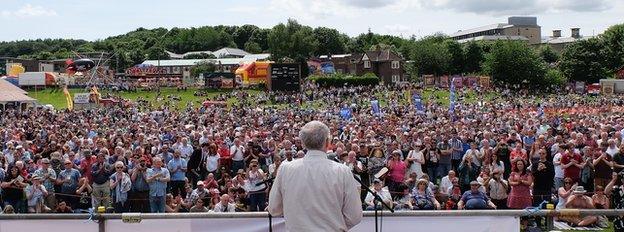
First elected to Parliament in 1983, the former trade union official has campaigned on a succession of left-wing causes, including the Campaign for Nuclear Disarmament (CND) and the Stop The War coalition, and is a columnist for the Morning Star.
He has frequently been at odds with his party, opposing the Iraq war and other foreign interventions and backing public ownership of the banks. Voting records suggest he has rebelled against Labour 533 times since the party came to power under Tony Blair in 1997.
He has said his leadership campaign marked the launch of a broader anti-austerity movement.

He currently has the backing of 49 local parties, to Andy Burnham's 48, Yvette Cooper's 33 and Liz Kendall is well behind with just five.
But a relatively small number of activists who go along to poorly-attended meetings in order to make a nomination can give the impression that an entire constituency backs a particular candidate. Many members who don't attend meetings regularly will simply vote privately from home. These party nominations carry no weight in the final result.
Fourth, though he has the backing of the big Unite union, there is no longer a bloc vote for them to put at Mr Corbyn's disposal - and no guarantee that the 30,000 or so of the union's members who have so far signed up to take part in the Labour leadership contest will follow the advice of their left-wing general-secretary Len McLuskey.
In the absence of reliable polling of party and union members, what do we know of how the Labour leadership contenders are performing?
'Corbyn effect'
Sources close to Yvette Cooper's s camp say that from telephoning Labour Party members, overall Andy Burnham appears to be slightly ahead, with their candidate closely behind and Jeremy Corbyn trailing in third place.
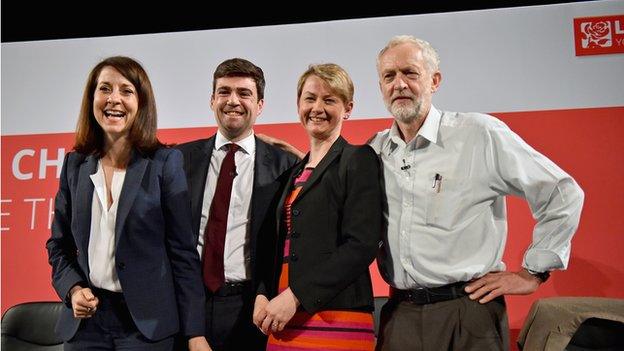
But among the party's newer recruits - the 50,000 who have joined since the election, as opposed to the 200,000 pre-election members - Mr Corbyn takes the lead.
Sources close to Liz Kendall admit that there is something of a "Corbyn effect" - from their contacts with party members, he isn't in the lead but is doing considerably better than the left wing leadership candidate Diane Abbott did in 2010. But they insist with many members yet to be contacted, the result is unpredictable and the current assessment of the candidates' relative strength is unreliable.
Andy Burnham's campaign team are sceptical than any proper polling of members exists, even privately - from their phone contacts with members, they say Mr Burnham is in the lead.
But this isn't a "first-past-the post" election.
So if no candidate gets more than 50% of the vote straight away, one of the four drops out and their second preference votes are distributed between the remaining candidates.
This process continues until one of them gains more than half the available vote.
Ms Cooper's supporters are hoping if Mr Corbyn drops out, they will inherit some of his support. Though she isn't as left-wing as he is, some on the left will feel it's high time for a female leader.
Topping the ballot?
Equally, as Mr Burnham has strongly defended public services and Labour's union links, his supporters would hope to pick up some of Mr Corbyn's support.
But some seasoned pollsters - based more on instinct than evidence - are openly discussing the possibility that Mr Corbyn will initially top the ballot.
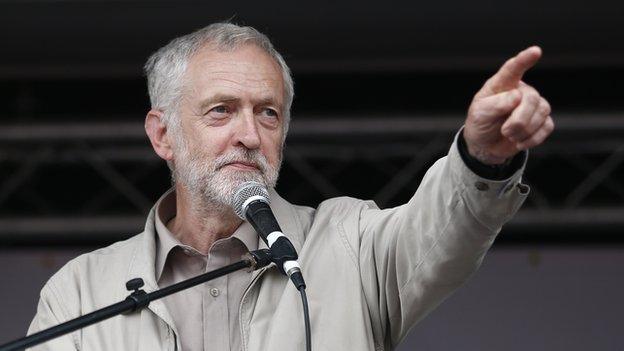
That's because he has the Unique Selling Point of saying the apparently unsayable and potentially garnering the entirety of the Left vote, while the more mainstream vote is split.
So - and this I admit is idle speculation - just say, he gets 28% of the vote while, for example, Andy Burnham and Yvette Cooper gain 25% each, and Liz Kendall trails slightly on 22%.
In this scenario, all candidates are quite closely bunched together. But by a narrow margin, Liz Kendall drops out.
As she is seen as "Blairite" very few of her second preference votes would go to the most left wing candidate.
Both Yvette Cooper and Andy Burnham could pick up substantial support, and despite a strong initial showing, Jeremy Corbyn would drop out of the running next.
Politically, though, this outcome could embarrass the eventual winner as across the despatch box at Prime Minister's Questions David Cameron would taunt his opponent as "Labour's second choice" - behind someone who wants to scrap tuition fees and Trident.
But all this might never happen because, at this stage, there is simply not enough reliable evidence of Labour members' voting intentions. We will know, however, when the votes are counted and declared on 12 September.
The "Corbyn effect" will be tested this Sunday when all four Labour leadership candidates set out their stall at 1100 BST on BBC One's The Sunday Politics.
- Published12 September 2015
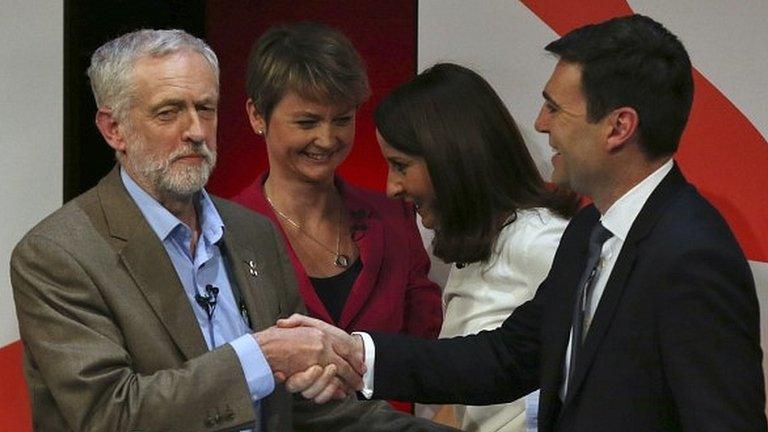
- Published13 July 2015
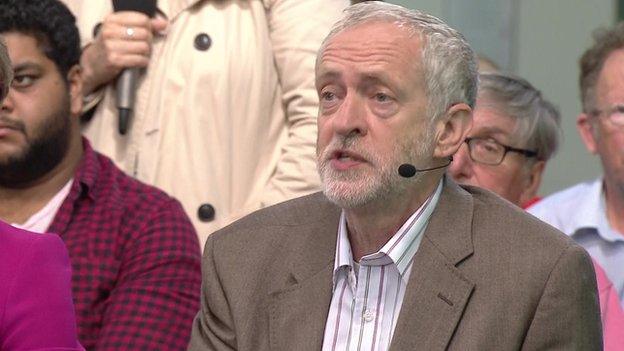
- Published5 July 2015
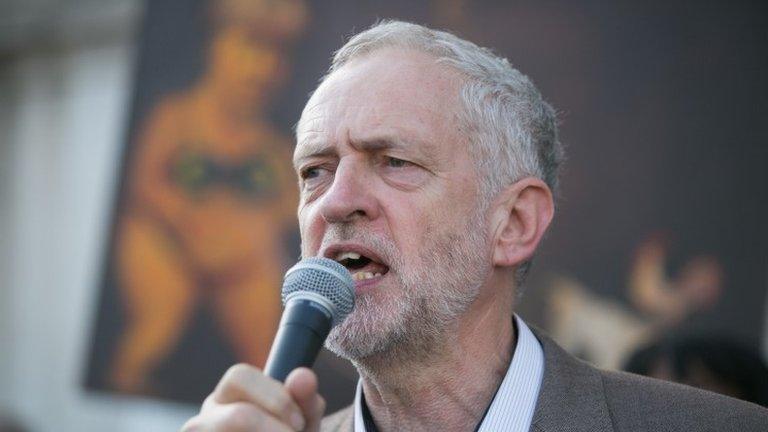
- Published13 July 2015
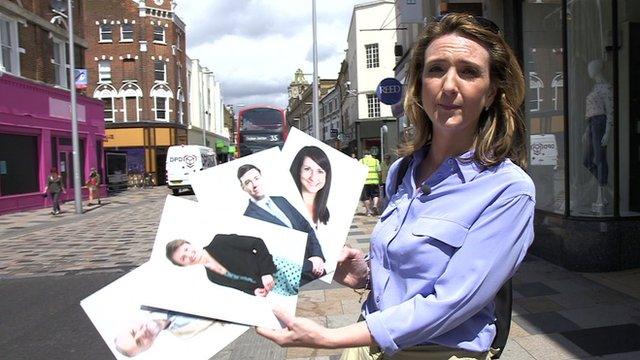
- Published18 June 2015